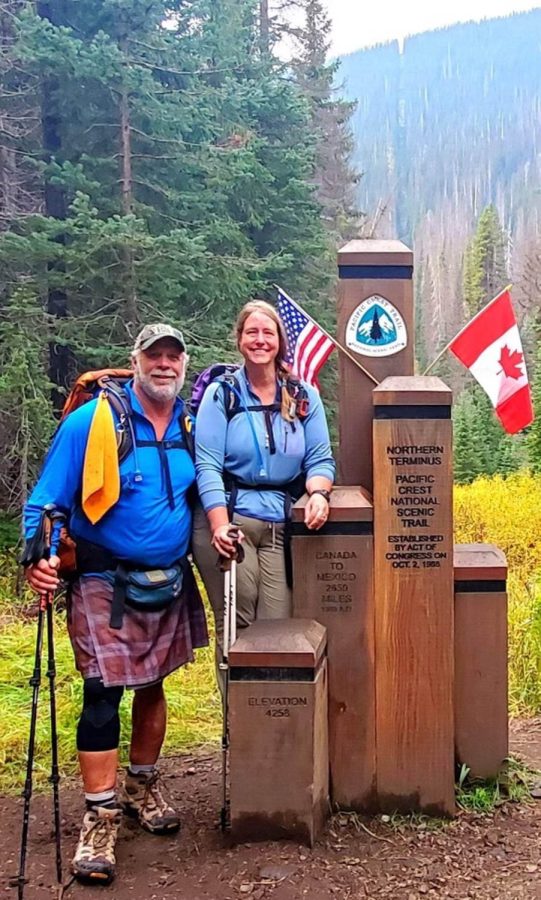The man who was saved by UREC employees from a heart attack
Ken Anderson stays active despite previous near-death experiences
Ken Anderson with his wife Cynthia Thia Anderson.
April 4, 2023
In mid-January, Ken Anderson was playing his weekly game of racquetball when his vision became blurry, and he suddenly felt weak in his legs.
Elsewhere at the WSU Recreation Center, student employee Jalen Barker was working a typical evening shift when his radio sounded the alarm.
“I immediately grabbed a defibrillator and ran up the stairs,” Barker said.
Barker sprinted up the steps to the racquetball court and saw Anderson lying unconscious on the hardwood floor.
A retired WSU staffer, Anderson had spent years as an avid outdoorsman and athlete. But now, in the throes of a heart attack, his survival relied on Barker and a team of two other student employees, Jaden Paine and Nolan Fisher.
This was not Anderson’s only brush with death on the WSU campus. In 2017, he suffered a cardiac arrest. Six years prior, he collided with a Pullman City bus while biking to work. Anderson’s bicycle was in the bus driver’s blind spot as his legs were sucked under the front wheel of the vehicle.
Despite extensive trauma to the muscles and tendons in his lower body, Anderson stayed active throughout and after his recovery. He suffered some permanent damage from the accident but was soon back to playing weekly racquetball matches with his friends and embarked on even more ambitious adventures. In 2020, he and his wife hiked along the 2,650-mile Pacific Crest Trail. Anderson attributes this incredible recovery to his family and friends.
“I had received a package from my friends which was a framed photograph of all my racquetball buddies along with one of my rackets. I hung them on the wall right next to my bed. I told myself that if I could ever stand on my own two feet again, I would go hiking again, I would go bike riding again, and I would play racquetball again, everything,” Anderson said.
After eight minutes of compressions and rescue breaths, the CPR and AED applied by Barker led Anderson to regain consciousness just as the first responders arrived. Doctors later stated that if it had not been for the quick actions of the student employees, the heart attack would have either killed Anderson or caused irreparable damage to his heart and brain.
“It was definitely a scary experience, but we had been trained on what to do and I am just thankful I was part of a great team that saved a life,” Paine said.
In late February, Anderson sat back down at the UREC for a heartfelt reunion with Barker, who had saved his life just a month prior.
“Because of your actions, I am still here walking and talking. You literally saved my life; I mean that’s what you call a hero right, and that’s what you guys are to me,” Anderson said.
Barker was honored by the compliment but refused, saying that his team was only doing what any other UREC staff would have done in the same situation.
Today, Anderson does not have any intentions of slowing down his active lifestyle and even has an upcoming trip planned to hike the 3,100-mile continental divide trail spanning from Mexico to Canada within the next year.
After cheating these scrapes with death, Anderson said the greater meaning behind his survival is still something constantly on his mind.
His perseverance through such traumatic events keeps Anderson going, hoping that his story of resilience and determination may serve as an inspiration to others who were unfortunate enough to experience a similar circumstance.
















Laura • Apr 4, 2023 at 3:08 pm
A beautiful story beautifully written!!!